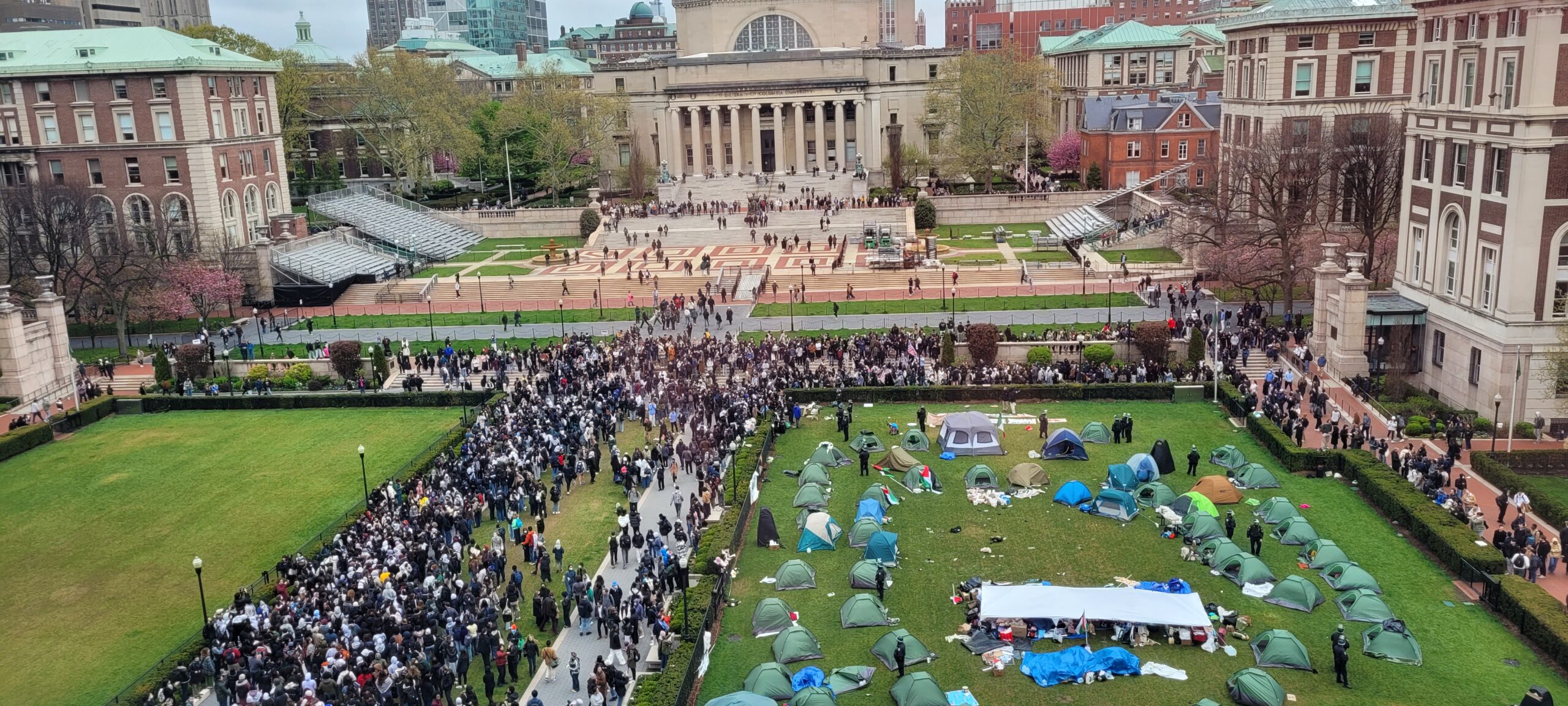
Published 05/03/2024 16:05
From the Black Lives Matter protests to opposition to the war in Vietnam and apartheid in South Africa, students have played a crucial role in liberation movements throughout history. Now, a new wave is emerging, focused on Palestine. Solidarity with Gaza is burning down university campuses across the world, from Japan to Australia, Italy and Yemen. Students are at the forefront of a global solidarity movement with Gaza, demanding justice and freedom for the Palestinian people.
After two tumultuous weeks, American universities experienced fewer disruptive pro-Palestinian protests on Friday, although there were some new arrests, including in New York. More than 2,000 arrests have been made on campuses across the country, according to a New York Times tally.
The movement began two weeks ago with a camp at Columbia University in New York and quickly spread globally, demanding that universities disassociate themselves from Israel. This global student movement raises important questions: is this the peace movement of our generation? And can students achieve what so much public pressure has failed to achieve?
If we think of visibility as a predominant measure of success, then the protests in Columbia, inspiring so many others and dominating global headlines, were triumphant. Yet at the same time, protesters have found their demands unmet — Columbia is not divesting from companies that profit from the Israeli occupation — and the campus has been closed to most people, with classes and final exams moved to teaching. remote, and students were threatened with expulsion. Additionally, anyone who chooses to remain on campus in the coming weeks will not be free from police, as university administrators, who oversee $14 billion in endowments, have asked the Police Department to remain on campus until mid-May. at taxpayers’ expense.
Possible agreement
The student mobilization is a response not only to the genocide in Gaza, but also to the complicity of its universities with Israeli arms companies and institutions. Students are pushing for concrete change and true global solidarity with Palestine. The goals include diversifying universities and ending their ties to companies that profit from human suffering. Palestinians are at the center of this movement, and students are determined to stay on the right side of history.
At Harvard University, for example, students occupied the campus, demanding that the institution divest itself of donations and partnerships linked to Israel. Despite administrative repression, students remain firm in their cause. The organizers’ concern is to avoid the type of radicalization that diverts the focus from the genocide in Gaza to an environment of dubious protest tactics.
A handful of universities, including Rutgers, agreed to consider some of the student protesters’ demands, peacefully ending the demonstrations but also drawing condemnation from some Jewish groups. Deals were reached this week at Brown, Northwestern and the University of Minnesota. Some Jewish groups have expressed outrage at these agreements, calling them a capitulation to protesters who have created a hostile environment on campus.
The university agreed to establish an Arab cultural center on the New Brunswick campus, conduct a feasibility study into creating a Middle Eastern studies department and “implement support” for 10 displaced Palestinian students to study at Rutgers, among other measures. He also promised not to retaliate against protest camp participants.
Regarding protesters’ demand that Rutgers end its partnership with Tel Aviv University, the university wrote: “Agreements with global partners are a matter of academic research.” The demonstrations expose to the world the size of the funding that universities promote in Israel, regardless of the use made of this result against the Palestinians.
Employee solidarity
An emerging trend is for students and administration staff to come together for common causes. From New York to the United Kingdom, and even in Canada and Australia, this solidarity is becoming increasingly evident.
The coalition formed by both has as its main objective the demilitarization of the university. Since the launch of the campaign, there has been a significant response, with staff providing logistical support and showing active solidarity with students.
In other parts of the world, such as at the University of Sydney in Australia and McGill University in Canada, indigenous people are also joining students in their struggles. This solidarity is fueled by the history of resistance and the search for justice on indigenous issues, which are seen as interconnected with current struggles.
The largest employee union at the University of California announced Thursday that it is preparing to ask some or all of its members to authorize a strike to protest the treatment of pro-Palestinian protesters at the University of California, Los Angeles. . The group said the university failed to protect union members who were among pro-Palestine student protesters when counter-protesters attacked a camp that had been set up since April 25.
Campus police at the scene did not intervene, and backup from the Los Angeles Police Department and California Highway Patrol did not arrive for hours. No arrests were made. The lack of response was quickly denounced by local leaders and Governor Gavin Newsom, as well as students and teachers. “The university was nowhere to be found for hours and hours,” said Rafael Jaime, co-president of the union and a doctoral candidate in the university’s English department. “They just stood there and allowed our colleagues to be brutalized.”
Arresting some 200 pro-Palestine protesters while failing to arrest any counter-protesters who assaulted them, he said, amounted to prioritizing anti-Palestine speech, which violated university employees’ rights to freedom of expression.
Around the world
Police in Paris on Friday detained students who had occupied a building at Sciences Po, one of France’s elite universities. Protesters at several universities in France have been pressing administrators to more strongly condemn Israel’s military offensive in Gaza and to review partnerships with Israeli universities and private donors.
In Australia, camps were set up at major universities in the cities of Adelaide, Canberra, Melbourne and Sydney. These protests grew more tense as pro-Israel protesters gathered nearby. At the University of Sydney, protests focus on the institution’s links with arms companies that collaborate in the production of drones used against Palestinians. Students are calling for an end to these links to avoid complicity in the genocide in Gaza.
In the UK, although the level of violence in repressing protests may be lower than in the US, the sophistication of political and police repression presents unique challenges. The “prevention strategy”, which criminalizes anti-imperialist politics and attacks Muslim students, is just one example of the barriers faced by British activists.
A union representing students at Trinity College Dublin said the university had fined them around $230,000 for financial losses arising from disruptive protests since last September over the war in Gaza, rising student fees and other issues. Laszlo Molnarfi, president of the Trinity College students’ union, said the union could not pay the fine. He called it an attempt at intimidation by the university, adding that the protests will continue.
Antisemitism
In the United States, students face not only a heavy police presence on campuses, but also threats of doxxing (disclosure of private personal data) and expulsion, as well as accusations of anti-Semitism. However, they remain vigilant and determined in their fight for Palestinian freedom.
Solidarity between Jewish and Palestinian students is evident on many campuses, defying attempts to exploit Jewish trauma to divert attention from the genocide in Gaza. The safety of Jewish students is also a concern, but the protests are inclusive and focused on justice for all.
While the media often focuses on the safety of privileged students, it is important not to forget the dangers faced by Palestinian students, including recent incidents of violence on campuses.
Children of Power
Amid the protests, an intriguing question emerges: the role of privileged students in the fight against the system. Sons and daughters of political and business elites are using their privilege to challenge the status quo.
At Columbia University, discussion about privilege has been intense. The sons and daughters of members of Congress and business executives are among protesters arrested during the protests. This raises questions about the role of the next generation of leaders emerging from institutions like Columbia.
At prestigious universities like the University of Warwick in the United Kingdom, students recognize the power they have and the influence they can exert on the media. This awareness fuels protesters’ determination to challenge established power structures.
At the University of Sydney, students reject the conventional idea of leadership in favor of a more inclusive, anti-oppression approach. They engage in a movement that seeks the liberation of Palestine and refuse to follow the traditional paths of the university.
At Cal State Polytechnic in Humboldt, in the United States, students barricaded police during a protest, using skills acquired amid constant fear of violent attacks. This resistance shows how students are trained, in a way, to revolt in an environment where repression is an everyday reality.
Despite the challenges they face, students are determined not to be silenced. In fact, they see repression as a catalyst for mobilization and learning about new forms of protest. It is a demonstration of adaptability in the face of adversity. While elite young people use their resources to challenge the system, they also face unique criticisms and challenges.
Source: vermelho.org.br

